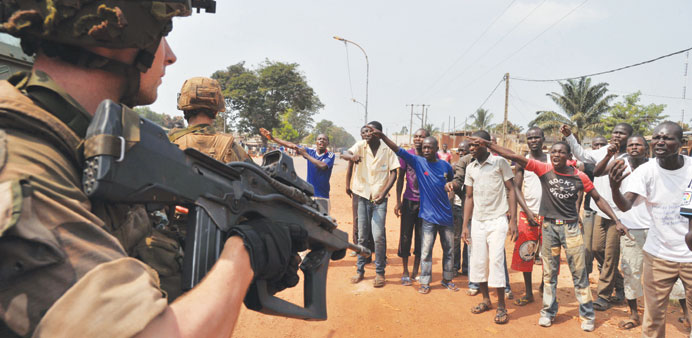|
Fresh Christian-Muslim violence has erupted in the Central African Republic, forcing new interim president Catherine Samba Panza to take time out yesterday from talks on forming a government tasked with ending the bloodshed. |
Residents said a night of fighting had shaken the capital, Bangui, following news that Christian vigilantes had killed a prominent Muslim politician on Friday – putting Samba Panza, the crisis-torn country’s first woman president, to the test even before she has had a chance to choose her ministers.
Aides said that Samba Panza, the former Bangui mayor picked by the interim parliament to try to get the beleaguered state back on its feet, had been forced to take a break from talks on her cabinet to devote part of her day to security issues.
The new violence broke out after members of a so-called “anti-balaka” – Christian militia formed in response to a wave of atrocities by mostly Muslim rebel group Seleka – reportedly killed Joseph Kalite, a Muslim former minister who had held cabinet posts in various governments.
Kalite was seen as close to Michel Djotodia, the Seleka leader who overthrew the country’s government in March last year and installed himself as president before being forced to resign on January 10 under international pressure over his inability to rein in his fighters.
Former Seleka rebels exchanged fire on Friday night with soldiers from the African Union-backed military force MISCA in various parts of the capital.
A commander from MISCA, which has about 5,200 troops and is backed by a 1,600-strong French force, said his unit had arrested about a dozen former Seleka fighters and seized their weapons after a firefight near the National Assembly.
Looters and anti-balaka fighters have also been regularly pillaging the capital’s central business district, whose shops are mostly Muslim-owned – often clashing with young Muslims and former Seleka rebels, with the violence spilling over into neighbouring areas.
Thousands of Muslims have fled the capital to neighbouring Chad to escape the unrest, part of the million people nationwide who have fled their homes.
Amnesty International said on Friday that French and MISCA troops needed to do more to protect the Muslim minority after its researchers found anti-balaka had killed more than 50 Muslims last week in two attacks northwest of Bangui, with victims ranging in age from seven months to 70 years old.
Amnesty said that after the second attack, on the village of Bossembele, it had found 25 bodies inside a mosque where Muslim residents had been taking refuge, and another 18 strewn around the building and nearby streets.
The attackers hacked many of their victims to death with machetes and knives, it said.
“International peacekeeping forces are failing the Muslim community,” said Joanne Mariner, the rights group’s senior crisis advisor in Bangui. “Scores of people were left unprotected from vicious anti-balaka reprisals at a time when such attacks were entirely predictable.”
Mariner said that the desire for vengeance among the Christian majority was “palpable” after Seleka’s rampage of killing, looting and raping while Djotodia was in power, and called for peacekeeping forces to do more to stop revenge attacks.
The imam at the mosque in central Bangui’s PK-5 district, Walidou Modibo, told journalists on Friday that Muslim religious leaders had given up calling for peace because of the atrocities against their community.
“(Imams) are letting the faithful decide what reactions they judge appropriate in the face of every new provocation,” he said, condemning “the surge of violence against Muslims and the complicit passivity of the forces tasked with maintaining order”.
Samba Panza, who was sworn in on Thursday, must restore a government that now exists in name only and organise general elections by February 2015, when she will be banned from standing again for office.
Outside the capital, warlords control large swathes of the country, a land-locked state among the poorest in the world whose history of coups and rebellions since independence from France in 1960 has kept it mired in poverty and instability despite its mining and agricultural potential.

